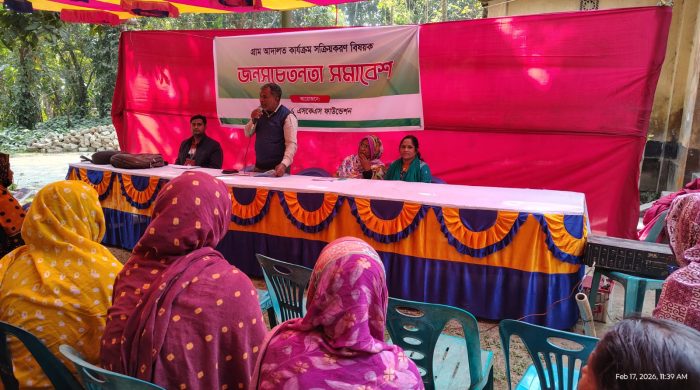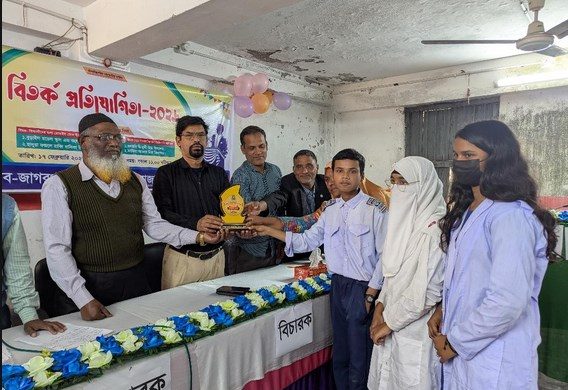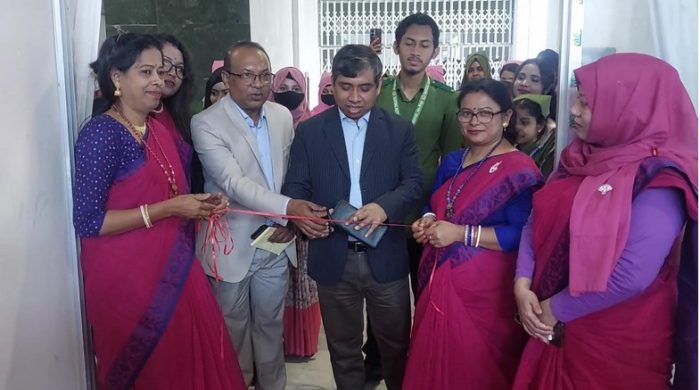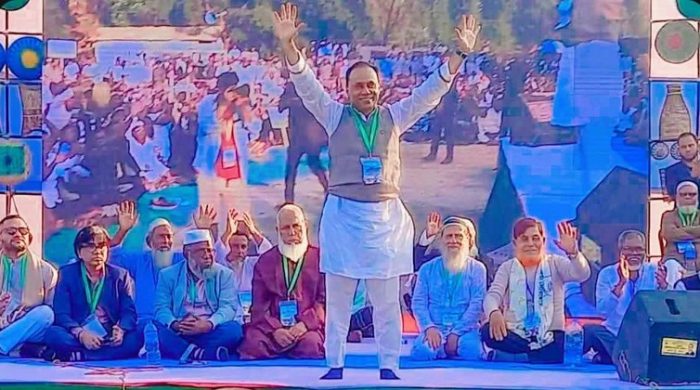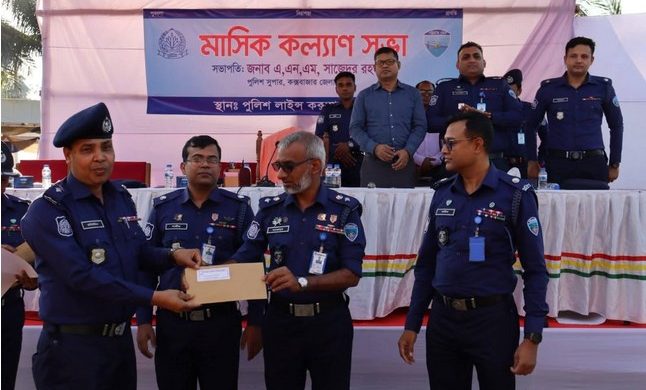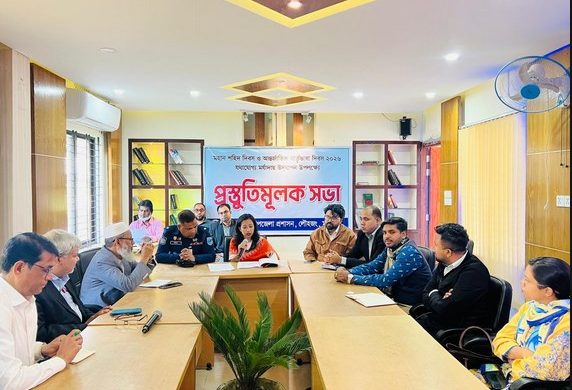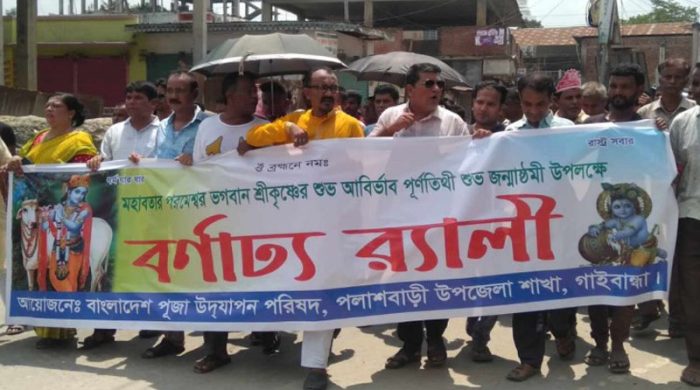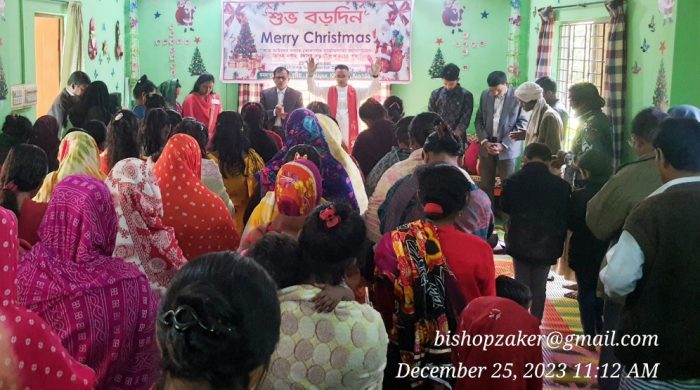‘Chir Uttana Mom Sheer’ Independence Square inaugurated in Rangpur
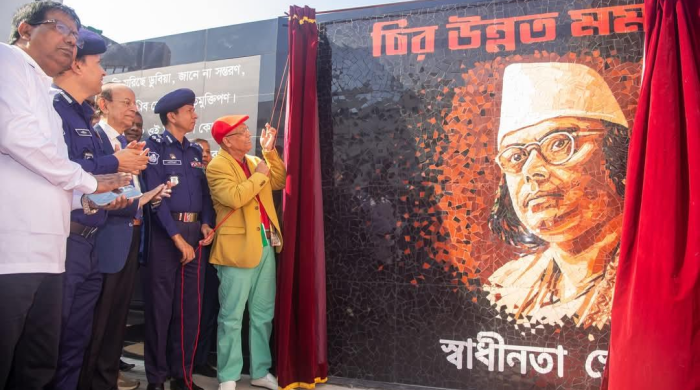
Selina Khatun, Rangpur
The ‘Chir Uttam Mom Sheer’ Independence Square has been set up at the Rangpur Police Line School and College grounds to showcase the songs, poems, essays and articles of the rebel poet Kazi Nazrul Islam to the new generation, as they are one of the most relevant to the student-public movement in the 2024 mass uprising.
The official inauguration was held on Wednesday (December 28) by the former executive director of the Kabi Nazrul Institute, the country’s renowned poet and Nazrul expert Abdul Hai Sikder.
Presided over by Rangpur Superintendent of Police Md. Sharif Uddin, Principal of Rangpur Police Line School and College Professor Jalal Uddin Akbar and others.
This aesthetically designed Independence Square has been established next to the Shaheed Minar in the northwest corner of the academic building of Rangpur Police Line School and College. The mural of the rebel poet Kazi Nazrul Islam has been decorated with marble stones and tiles.
The famous photo of poet Kazi Nazrul wearing a cap has been inserted. The photo has been portrayed in such a way that it contains the fire of rebellion, a song of equality, a pledge to stand against exploitation, a poem of non-communal consciousness, a motivation for economic liberation, and a song of love between people.
Next to it are four lines from the poem ‘Kandari Hoshiar’, a symbol of the non-discriminatory humane and democratic spirit of the rebel poet Kazi Nazrul Islam, which reads:
“The helpless nation is drowning, not knowing how to swim,
Kandari! Today I will see your mother’s liberation!
‘Are they Hindus or Muslims?’ Who is the answer to that question?
“Kandari! The ball is drowning, my mother’s child!”
Students of the Fine Arts Department of Dhaka University installed this aesthetically designed mural, planned by Rangpur Police Superintendent Md. Sharif Uddin.
Jahangir Alam, Vice Principal (Academic) of Police Lines School and College, said, ‘Poet Kazi Nazrul Islam is a true nationalist poet of the Bengali nation. During the British rule, Nazrul Islam raised the flag of rebellion for the overall liberation of the people of India in his poems. Nazrul’s rebellion was mainly against British rule. But although poet Nazrul was recognized as a nationalist poet by the common people of post-British India, he could not officially become an Indian nationalist poet later. Therefore, independent Bangladesh poet Nazrul Islam has been praised as a patriotic humanist and nationalist poet of Bangladesh. The current revolutionary government has recognized Nazrul Islam as the national poet by the state. Nazrul Islam’s poems and songs were a great inspiration in the July-August Revolution. Therefore, this small effort of Police Lines School and College, Rangpur, is to present Nazrul anew to this generation.
He said, “I believe that in the presence of the renowned poet Abdul Hai Sikder, the spirit of Nazrul will spread to all educational institutions in Rangpur and Bangladesh.”
Police Lines School and College Vice Principal (Administration) A. N. M. Babar Ali said, ‘Since poet Kazi Nazrul Islam is the source of inspiration for implementing the July Revolution. That is why, right after the revolution, we have taken this initiative to immortalize the practice of poet Kazi Nazrul Nazrul Islam.’
Rangpur Police Line School and College Principal Professor Jalal Uddin Akbar said, “After the 24th mass uprising, Rangpur Police Line School and College decided to celebrate the first Victory Day for a month. In light of this, we have built Independence Square around poet Kazi Nazrul Islam. We think that through this, the study of Nazrul will add a new dimension among teachers, students, and guardians, and if an open platform for the study of Nazrul is created in every institution like this, then Nazrul will become more inevitable among us.”
Rangpur Police Superintendent Md. Sharif Uddin told reporters that poet Kazi Nazrul Islam is present in the minds of every person in this subcontinent. His songs and poems and articles and articles are symbols of the ideals of nationalism. His writings against discrimination and discrimination and for non-communalism will remain relevant as long as the world exists. Kazi Nazrul Islam became the most relevant in the July Revolution. It has been seen that poet Kazi Nazrul Islam’s songs, poems and articles and registrations were recited by the student crowd in the July Revolution. We felt that there should be initiatives at every end to promote poet Kazi Nazrul Islam to the young generation. For this reason, we have taken the initiative to build Swadhinata Square in memory of poet Kazi Nazrul Islam by deciding through the meeting of the management committee. We think that a new era of Nazrul’s practice will be opened here. Especially students and teachers will be able to realize the inevitability of Nazrul. We have tried to build this square in an aesthetic way. That is why we have added four lines of the poem Kandari Hoshiar next to the mural. The four poems that have the foundation of humanity, non-communalism and democracy. We want to interest parents, students, officials and employees as well as parents in practicing Nazrul. That is why we have this initiative. That is why we are inaugurating this square with renowned Nazrul researcher and former executive director of Nazrul Institute, poet Abdul Hai Sikder.
Former executive director of the Nazrul Institute, multi-dimensional poet Abdul Hai Sikder told reporters, “Just as a human being needs food, clothing, shelter, medicine, light and air, similarly, poet Nazrul is always relevant for Bangladesh. Bangladesh means Nazrul. Wherever the exploited speak out against exploitation, Nazrul is there.”
Poet Abdul Hai Sikder also said, “In every utterance of the July Revolution, poet Nazrul’s writings have become a symbol of the inevitable revolution, reflected in every action, including writing slogans on walls.” I thank Rangpur Police Line School and College for the initiative taken by Bangladesh Police to build Nazrul Square to showcase Nazrul to the new generation.
Through this, the multidimensional relevance of poet Kazi Nazrul Islam will be stirred and awakened to the new generation. Through this, the desire to build a society and state without discrimination will be realized.
Incidentally: Although Kazi Nazrul Islam has been recognized as the National Poet since 1987, no gazette has been published in this regard. He is only mentioned as the National Poet in the Kazi Nazrul Institute Act. The current interim government has decided to issue a gazette to declare Kazi Nazrul Islam as the National Poet.
Kazi Nazrul Islam was born on May 24, 1899 (11th Jyaishta, 1306 Bangabhab) in the village of Churulia, West Bengal, India. In a literary career of just 23 years, his contribution to various branches of literature, including poetry, songs, novels, short stories, is unparalleled.






